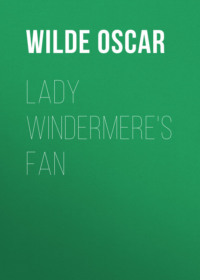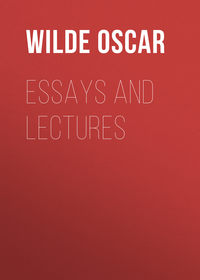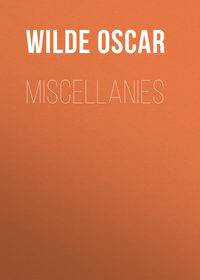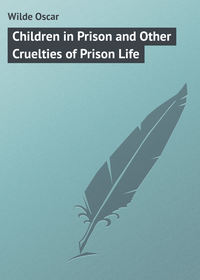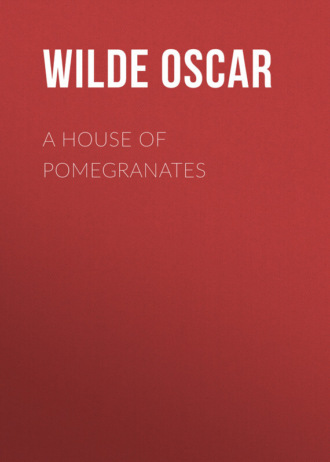 полная версия
полная версияA House of Pomegranates
And three hours before dawn, and while it was still night, his Soul waked him and said to him, ‘Rise up and go to the room of the merchant, even to the room in which he sleepeth, and slay him, and take from him his gold, for we have need of it.’
And the young Fisherman rose up and crept towards the room of the merchant, and over the feet of the merchant there was lying a curved sword, and the tray by the side of the merchant held nine purses of gold. And he reached out his hand and touched the sword, and when he touched it the merchant started and awoke, and leaping up seized himself the sword and cried to the young Fisherman, ‘Dost thou return evil for good, and pay with the shedding of blood for the kindness that I have shown thee?’
And his Soul said to the young Fisherman, ‘Strike him,’ and he struck him so that he swooned and he seized then the nine purses of gold, and fled hastily through the garden of pomegranates, and set his face to the star that is the star of morning.
And when they had gone a league from the city, the young Fisherman beat his breast, and said to his Soul, ‘Why didst thou bid me slay the merchant and take his gold? Surely thou art evil.’
But his Soul answered him, ‘Be at peace, be at peace.’
‘Nay,’ cried the young Fisherman, ‘I may not be at peace, for all that thou hast made me to do I hate. Thee also I hate, and I bid thee tell me wherefore thou hast wrought with me in this wise.’
And his Soul answered him, ‘When thou didst send me forth into the world thou gavest me no heart, so I learned to do all these things and love them.’
‘What sayest thou?’ murmured the young Fisherman.
‘Thou knowest,’ answered his Soul, ‘thou knowest it well. Hast thou forgotten that thou gavest me no heart? I trow not. And so trouble not thyself nor me, but be at peace, for there is no pain that thou shalt not give away, nor any pleasure that thou shalt not receive.’
And when the young Fisherman heard these words he trembled and said to his Soul, ‘Nay, but thou art evil, and hast made me forget my love, and hast tempted me with temptations, and hast set my feet in the ways of sin.’
And his Soul answered him, ‘Thou hast not forgotten that when thou didst send me forth into the world thou gavest me no heart. Come, let us go to another city, and make merry, for we have nine purses of gold.’
But the young Fisherman took the nine purses of gold, and flung them down, and trampled on them.
‘Nay,’ he cried, ‘but I will have nought to do with thee, nor will I journey with thee anywhere, but even as I sent thee away before, so will I send thee away now, for thou hast wrought me no good.’ And he turned his back to the moon, and with the little knife that had the handle of green viper’s skin he strove to cut from his feet that shadow of the body which is the body of the Soul.
Yet his Soul stirred not from him, nor paid heed to his command, but said to him, ‘The spell that the Witch told thee avails thee no more, for I may not leave thee, nor mayest thou drive me forth. Once in his life may a man send his Soul away, but he who receiveth back his Soul must keep it with him for ever, and this is his punishment and his reward.’
And the young Fisherman grew pale and clenched his hands and cried, ‘She was a false Witch in that she told me not that.’
‘Nay,’ answered his Soul, ‘but she was true to Him she worships, and whose servant she will be ever.’
And when the young Fisherman knew that he could no longer get rid of his Soul, and that it was an evil Soul and would abide with him always, he fell upon the ground weeping bitterly.
And when it was day the young Fisherman rose up and said to his Soul, ‘I will bind my hands that I may not do thy bidding, and close my lips that I may not speak thy words, and I will return to the place where she whom I love has her dwelling. Even to the sea will I return, and to the little bay where she is wont to sing, and I will call to her and tell her the evil I have done and the evil thou hast wrought on me.’
And his Soul tempted him and said, ‘Who is thy love, that thou shouldst return to her? The world has many fairer than she is. There are the dancing-girls of Samaris who dance in the manner of all kinds of birds and beasts. Their feet are painted with henna, and in their hands they have little copper bells. They laugh while they dance, and their laughter is as clear as the laughter of water. Come with me and I will show them to thee. For what is this trouble of thine about the things of sin? Is that which is pleasant to eat not made for the eater? Is there poison in that which is sweet to drink? Trouble not thyself, but come with me to another city. There is a little city hard by in which there is a garden of tulip-trees. And there dwell in this comely garden white peacocks and peacocks that have blue breasts. Their tails when they spread them to the sun are like disks of ivory and like gilt disks. And she who feeds them dances for their pleasure, and sometimes she dances on her hands and at other times she dances with her feet. Her eyes are coloured with stibium, and her nostrils are shaped like the wings of a swallow. From a hook in one of her nostrils hangs a flower that is carved out of a pearl. She laughs while she dances, and the silver rings that are about her ankles tinkle like bells of silver. And so trouble not thyself any more, but come with me to this city.’
But the young Fisherman answered not his Soul, but closed his lips with the seal of silence and with a tight cord bound his hands, and journeyed back to the place from which he had come, even to the little bay where his love had been wont to sing. And ever did his Soul tempt him by the way, but he made it no answer, nor would he do any of the wickedness that it sought to make him to do, so great was the power of the love that was within him.
And when he had reached the shore of the sea, he loosed the cord from his hands, and took the seal of silence from his lips, and called to the little Mermaid. But she came not to his call, though he called to her all day long and besought her.
And his Soul mocked him and said, ‘Surely thou hast but little joy out of thy love. Thou art as one who in time of death pours water into a broken vessel. Thou givest away what thou hast, and nought is given to thee in return. It were better for thee to come with me, for I know where the Valley of Pleasure lies, and what things are wrought there.’
But the young Fisherman answered not his Soul, but in a cleft of the rock he built himself a house of wattles, and abode there for the space of a year. And every morning he called to the Mermaid, and every noon he called to her again, and at night-time he spake her name. Yet never did she rise out of the sea to meet him, nor in any place of the sea could he find her though he sought for her in the caves and in the green water, in the pools of the tide and in the wells that are at the bottom of the deep.
And ever did his Soul tempt him with evil, and whisper of terrible things. Yet did it not prevail against him, so great was the power of his love.
And after the year was over, the Soul thought within himself, ‘I have tempted my master with evil, and his love is stronger than I am. I will tempt him now with good, and it may be that he will come with me.’
So he spake to the young Fisherman and said, ‘I have told thee of the joy of the world, and thou hast turned a deaf ear to me. Suffer me now to tell thee of the world’s pain, and it may be that thou wilt hearken. For of a truth pain is the Lord of this world, nor is there any one who escapes from its net. There be some who lack raiment, and others who lack bread. There be widows who sit in purple, and widows who sit in rags. To and fro over the fens go the lepers, and they are cruel to each other. The beggars go up and down on the highways, and their wallets are empty. Through the streets of the cities walks Famine, and the Plague sits at their gates. Come, let us go forth and mend these things, and make them not to be. Wherefore shouldst thou tarry here calling to thy love, seeing she comes not to thy call? And what is love, that thou shouldst set this high store upon it?’
But the young Fisherman answered it nought, so great was the power of his love. And every morning he called to the Mermaid, and every noon he called to her again, and at night-time he spake her name. Yet never did she rise out of the sea to meet him, nor in any place of the sea could he find her, though he sought for her in the rivers of the sea, and in the valleys that are under the waves, in the sea that the night makes purple, and in the sea that the dawn leaves grey.
And after the second year was over, the Soul said to the young Fisherman at night-time, and as he sat in the wattled house alone, ‘Lo! now I have tempted thee with evil, and I have tempted thee with good, and thy love is stronger than I am. Wherefore will I tempt thee no longer, but I pray thee to suffer me to enter thy heart, that I may be one with thee even as before.’
‘Surely thou mayest enter,’ said the young Fisherman, ‘for in the days when with no heart thou didst go through the world thou must have much suffered.’
‘Alas!’ cried his Soul, ‘I can find no place of entrance, so compassed about with love is this heart of thine.’
‘Yet I would that I could help thee,’ said the young Fisherman.
And as he spake there came a great cry of mourning from the sea, even the cry that men hear when one of the Sea-folk is dead. And the young Fisherman leapt up, and left his wattled house, and ran down to the shore. And the black waves came hurrying to the shore, bearing with them a burden that was whiter than silver. White as the surf it was, and like a flower it tossed on the waves. And the surf took it from the waves, and the foam took it from the surf, and the shore received it, and lying at his feet the young Fisherman saw the body of the little Mermaid. Dead at his feet it was lying.
Weeping as one smitten with pain he flung himself down beside it, and he kissed the cold red of the mouth, and toyed with the wet amber of the hair. He flung himself down beside it on the sand, weeping as one trembling with joy, and in his brown arms he held it to his breast. Cold were the lips, yet he kissed them. Salt was the honey of the hair, yet he tasted it with a bitter joy. He kissed the closed eyelids, and the wild spray that lay upon their cups was less salt than his tears.
And to the dead thing he made confession. Into the shells of its ears he poured the harsh wine of his tale. He put the little hands round his neck, and with his fingers he touched the thin reed of the throat. Bitter, bitter was his joy, and full of strange gladness was his pain.
The black sea came nearer, and the white foam moaned like a leper. With white claws of foam the sea grabbled at the shore. From the palace of the Sea-King came the cry of mourning again, and far out upon the sea the great Tritons blew hoarsely upon their horns.
‘Flee away,’ said his Soul, ‘for ever doth the sea come nigher, and if thou tarriest it will slay thee. Flee away, for I am afraid, seeing that thy heart is closed against me by reason of the greatness of thy love. Flee away to a place of safety. Surely thou wilt not send me without a heart into another world?’
But the young Fisherman listened not to his Soul, but called on the little Mermaid and said, ‘Love is better than wisdom, and more precious than riches, and fairer than the feet of the daughters of men. The fires cannot destroy it, nor can the waters quench it. I called on thee at dawn, and thou didst not come to my call. The moon heard thy name, yet hadst thou no heed of me. For evilly had I left thee, and to my own hurt had I wandered away. Yet ever did thy love abide with me, and ever was it strong, nor did aught prevail against it, though I have looked upon evil and looked upon good. And now that thou art dead, surely I will die with thee also.’
And his Soul besought him to depart, but he would not, so great was his love. And the sea came nearer, and sought to cover him with its waves, and when he knew that the end was at hand he kissed with mad lips the cold lips of the Mermaid, and the heart that was within him brake. And as through the fulness of his love his heart did break, the Soul found an entrance and entered in, and was one with him even as before. And the sea covered the young Fisherman with its waves.
And in the morning the Priest went forth to bless the sea, for it had been troubled. And with him went the monks and the musicians, and the candle-bearers, and the swingers of censers, and a great company.
And when the Priest reached the shore he saw the young Fisherman lying drowned in the surf, and clasped in his arms was the body of the little Mermaid. And he drew back frowning, and having made the sign of the cross, he cried aloud and said, ‘I will not bless the sea nor anything that is in it. Accursed be the Sea-folk, and accursed be all they who traffic with them. And as for him who for love’s sake forsook God, and so lieth here with his leman slain by God’s judgment, take up his body and the body of his leman, and bury them in the corner of the Field of the Fullers, and set no mark above them, nor sign of any kind, that none may know the place of their resting. For accursed were they in their lives, and accursed shall they be in their deaths also.’
And the people did as he commanded them, and in the corner of the Field of the Fullers, where no sweet herbs grew, they dug a deep pit, and laid the dead things within it.
And when the third year was over, and on a day that was a holy day, the Priest went up to the chapel, that he might show to the people the wounds of the Lord, and speak to them about the wrath of God.
And when he had robed himself with his robes, and entered in and bowed himself before the altar, he saw that the altar was covered with strange flowers that never had been seen before. Strange were they to look at, and of curious beauty, and their beauty troubled him, and their odour was sweet in his nostrils. And he felt glad, and understood not why he was glad.
And after that he had opened the tabernacle, and incensed the monstrance that was in it, and shown the fair wafer to the people, and hid it again behind the veil of veils, he began to speak to the people, desiring to speak to them of the wrath of God. But the beauty of the white flowers troubled him, and their odour was sweet in his nostrils, and there came another word into his lips, and he spake not of the wrath of God, but of the God whose name is Love. And why he so spake, he knew not.
And when he had finished his word the people wept, and the Priest went back to the sacristy, and his eyes were full of tears. And the deacons came in and began to unrobe him, and took from him the alb and the girdle, the maniple and the stole. And he stood as one in a dream.
And after that they had unrobed him, he looked at them and said, ‘What are the flowers that stand on the altar, and whence do they come?’
And they answered him, ‘What flowers they are we cannot tell, but they come from the corner of the Fullers’ Field.’ And the Priest trembled, and returned to his own house and prayed.
And in the morning, while it was still dawn, he went forth with the monks and the musicians, and the candle-bearers and the swingers of censers, and a great company, and came to the shore of the sea, and blessed the sea, and all the wild things that are in it. The Fauns also he blessed, and the little things that dance in the woodland, and the bright-eyed things that peer through the leaves. All the things in God’s world he blessed, and the people were filled with joy and wonder. Yet never again in the corner of the Fullers’ Field grew flowers of any kind, but the field remained barren even as before. Nor came the Sea-folk into the bay as they had been wont to do, for they went to another part of the sea.
THE STAR-CHILD
TOMISS MARGOT TENNANT[MRS. ASQUITH]Once upon a time two poor Woodcutters were making their way home through a great pine-forest. It was winter, and a night of bitter cold. The snow lay thick upon the ground, and upon the branches of the trees: the frost kept snapping the little twigs on either side of them, as they passed: and when they came to the Mountain-Torrent she was hanging motionless in air, for the Ice-King had kissed her.
So cold was it that even the animals and the birds did not know what to make of it.
‘Ugh!’ snarled the Wolf, as he limped through the brushwood with his tail between his legs, ‘this is perfectly monstrous weather. Why doesn’t the Government look to it?’
‘Weet! weet! weet!’ twittered the green Linnets, ‘the old Earth is dead and they have laid her out in her white shroud.’
‘The Earth is going to be married, and this is her bridal dress,’ whispered the Turtle-doves to each other. Their little pink feet were quite frost-bitten, but they felt that it was their duty to take a romantic view of the situation.
‘Nonsense!’ growled the Wolf. ‘I tell you that it is all the fault of the Government, and if you don’t believe me I shall eat you.’ The Wolf had a thoroughly practical mind, and was never at a loss for a good argument.
‘Well, for my own part,’ said the Woodpecker, who was a born philosopher, ‘I don’t care an atomic theory for explanations. If a thing is so, it is so, and at present it is terribly cold.’
Terribly cold it certainly was. The little Squirrels, who lived inside the tall fir-tree, kept rubbing each other’s noses to keep themselves warm, and the Rabbits curled themselves up in their holes, and did not venture even to look out of doors. The only people who seemed to enjoy it were the great horned Owls. Their feathers were quite stiff with rime, but they did not mind, and they rolled their large yellow eyes, and called out to each other across the forest, ‘Tu-whit! Tu-whoo! Tu-whit! Tu-whoo! what delightful weather we are having!’
On and on went the two Woodcutters, blowing lustily upon their fingers, and stamping with their huge iron-shod boots upon the caked snow. Once they sank into a deep drift, and came out as white as millers are, when the stones are grinding; and once they slipped on the hard smooth ice where the marsh-water was frozen, and their faggots fell out of their bundles, and they had to pick them up and bind them together again; and once they thought that they had lost their way, and a great terror seized on them, for they knew that the Snow is cruel to those who sleep in her arms. But they put their trust in the good Saint Martin, who watches over all travellers, and retraced their steps, and went warily, and at last they reached the outskirts of the forest, and saw, far down in the valley beneath them, the lights of the village in which they dwelt.
So overjoyed were they at their deliverance that they laughed aloud, and the Earth seemed to them like a flower of silver, and the Moon like a flower of gold.
Yet, after that they had laughed they became sad, for they remembered their poverty, and one of them said to the other, ‘Why did we make merry, seeing that life is for the rich, and not for such as we are? Better that we had died of cold in the forest, or that some wild beast had fallen upon us and slain us.’
‘Truly,’ answered his companion, ‘much is given to some, and little is given to others. Injustice has parcelled out the world, nor is there equal division of aught save of sorrow.’
But as they were bewailing their misery to each other this strange thing happened. There fell from heaven a very bright and beautiful star. It slipped down the side of the sky, passing by the other stars in its course, and, as they watched it wondering, it seemed to them to sink behind a clump of willow-trees that stood hard by a little sheepfold no more than a stone’s-throw away.
‘Why! there is a crook of gold for whoever finds it,’ they cried, and they set to and ran, so eager were they for the gold.
And one of them ran faster than his mate, and outstripped him, and forced his way through the willows, and came out on the other side, and lo! there was indeed a thing of gold lying on the white snow. So he hastened towards it, and stooping down placed his hands upon it, and it was a cloak of golden tissue, curiously wrought with stars, and wrapped in many folds. And he cried out to his comrade that he had found the treasure that had fallen from the sky, and when his comrade had come up, they sat them down in the snow, and loosened the folds of the cloak that they might divide the pieces of gold. But, alas! no gold was in it, nor silver, nor, indeed, treasure of any kind, but only a little child who was asleep.
And one of them said to the other: ‘This is a bitter ending to our hope, nor have we any good fortune, for what doth a child profit to a man? Let us leave it here, and go our way, seeing that we are poor men, and have children of our own whose bread we may not give to another.’
But his companion answered him: ‘Nay, but it were an evil thing to leave the child to perish here in the snow, and though I am as poor as thou art, and have many mouths to feed, and but little in the pot, yet will I bring it home with me, and my wife shall have care of it.’
So very tenderly he took up the child, and wrapped the cloak around it to shield it from the harsh cold, and made his way down the hill to the village, his comrade marvelling much at his foolishness and softness of heart.
And when they came to the village, his comrade said to him, ‘Thou hast the child, therefore give me the cloak, for it is meet that we should share.’
But he answered him: ‘Nay, for the cloak is neither mine nor thine, but the child’s only,’ and he bade him Godspeed, and went to his own house and knocked.
And when his wife opened the door and saw that her husband had returned safe to her, she put her arms round his neck and kissed him, and took from his back the bundle of faggots, and brushed the snow off his boots, and bade him come in.
But he said to her, ‘I have found something in the forest, and I have brought it to thee to have care of it,’ and he stirred not from the threshold.
‘What is it?’ she cried. ‘Show it to me, for the house is bare, and we have need of many things.’ And he drew the cloak back, and showed her the sleeping child.
‘Alack, goodman!’ she murmured, ‘have we not children of our own, that thou must needs bring a changeling to sit by the hearth? And who knows if it will not bring us bad fortune? And how shall we tend it?’ And she was wroth against him.
‘Nay, but it is a Star-Child,’ he answered; and he told her the strange manner of the finding of it.
But she would not be appeased, but mocked at him, and spoke angrily, and cried: ‘Our children lack bread, and shall we feed the child of another? Who is there who careth for us? And who giveth us food?’
‘Nay, but God careth for the sparrows even, and feedeth them,’ he answered.
‘Do not the sparrows die of hunger in the winter?’ she asked. ‘And is it not winter now?’
And the man answered nothing, but stirred not from the threshold.
And a bitter wind from the forest came in through the open door, and made her tremble, and she shivered, and said to him: ‘Wilt thou not close the door? There cometh a bitter wind into the house, and I am cold.’
‘Into a house where a heart is hard cometh there not always a bitter wind?’ he asked. And the woman answered him nothing, but crept closer to the fire.
And after a time she turned round and looked at him, and her eyes were full of tears. And he came in swiftly, and placed the child in her arms, and she kissed it, and laid it in a little bed where the youngest of their own children was lying. And on the morrow the Woodcutter took the curious cloak of gold and placed it in a great chest, and a chain of amber that was round the child’s neck his wife took and set it in the chest also.
So the Star-Child was brought up with the children of the Woodcutter, and sat at the same board with them, and was their playmate. And every year he became more beautiful to look at, so that all those who dwelt in the village were filled with wonder, for, while they were swarthy and black-haired, he was white and delicate as sawn ivory, and his curls were like the rings of the daffodil. His lips, also, were like the petals of a red flower, and his eyes were like violets by a river of pure water, and his body like the narcissus of a field where the mower comes not.
Yet did his beauty work him evil. For he grew proud, and cruel, and selfish. The children of the Woodcutter, and the other children of the village, he despised, saying that they were of mean parentage, while he was noble, being sprang from a Star, and he made himself master over them, and called them his servants. No pity had he for the poor, or for those who were blind or maimed or in any way afflicted, but would cast stones at them and drive them forth on to the highway, and bid them beg their bread elsewhere, so that none save the outlaws came twice to that village to ask for alms. Indeed, he was as one enamoured of beauty, and would mock at the weakly and ill-favoured, and make jest of them; and himself he loved, and in summer, when the winds were still, he would lie by the well in the priest’s orchard and look down at the marvel of his own face, and laugh for the pleasure he had in his fairness.


